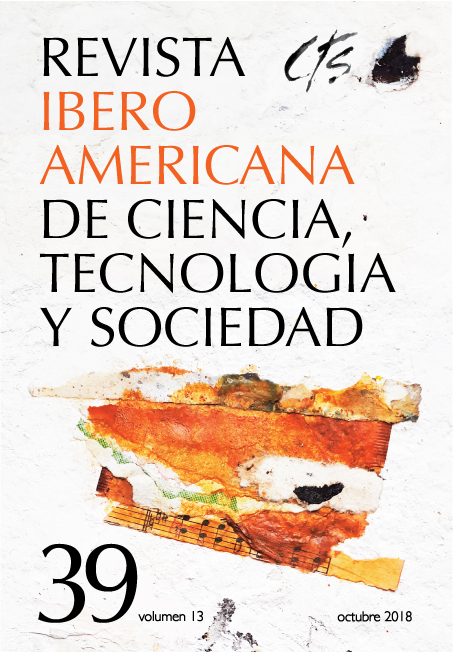Tipologias sobre o conhecimento: uma revisão crítica e uma proposta materialista
Palavras-chave:
conhecimento, tipologia, economia do conhecimento, materialismo cognitivoResumo
Este artigo revisa e sistematiza algumas das tipologias mais relevantes em relação ao conhecimento. Aponta suas limitações e apresenta uma alternativa que decorre da nossa perspectiva teórica: o materialismo cognitivo. Assim, em um percurso parcialmente arbitrário pela economia da inovação e o management, são criticadas as tipologizações de Lundvall, Machlup, Mokyr, Spender, Blackler e Chartrand. Então, coletando os elementos obtidos na análise anterior, é brevemente introduzida a proposta de tipologia do materialismo cognitivo, baseada na distinção de classes de conhecimentos de acordo com os suportes materiais nos quais eles existem. Propõe-se, assim, uma divisão em quatro tipos: conhecimentos de suportes biológico, subjetivo, intersubjetivo e objetivo, cada um deles com seus respectivos subtipos.Downloads
Referências
ANCORI, B., BURETH, A. y COHENDET, P. (2000): “The Economics of Knowledge: The Debate about Codification and Tacit Knowledge”, Industrial and Corporate Change, vol. 9, n° 2, pp. 255-283.
BATESON, G. (1972): Steps to an Ecology of Mind, Nueva York, Ballantine Books.
BLACKLER, F. (1995): “Knowledge, knowledge work and organizations: an overview and interpretation”, Organization Studies, vol 16, n° 6, pp. 1021-1046.
CHARTRAND, H. (2007): The Competitiveness of Nations in a Global Knowledge Based Economy. Ideological Evolution, La Vergne, VDM Verlag Dr. Mulle.
COLLINS, H. (2010): Tacit and Explicit Knowledge, Chicago, University of Chicago Press.
CORNES, R. y SANDLER, T. (1996): The theory of externalities, public goods, and club goods, Cambridge, Cambridge University Press.
COWAN, R., DAVID, P. y FORAY, D. (2000): “The Explicit Economics of Knowledge Codification and Tacitness”, Industrial and Corporate Change, vol. 9, nº 2.
DURKHEIM, E. (1993 [1893]): La División del Trabajo Social, Buenos Aires, Planeta Agostini.
DURKHEIM, E. (1986 [1895]): Las reglas del método sociológico, Buenos Aires, Hispamérica.
FORAY, D. y LUNDVALL, B. (1996): “The knowledge-based economy: From the economics of knowledge to the learning economy”, Employment and growth in the knowledge-based economy, París, OCDE.
FOUCAULT, M. (1989): Las palabras y las cosas, México DF, Siglo XXI.
GIULIANI, E. (2002): ¨Cluster absorptive capability: an evolutionary approach for industrial clusters in developing countries¨, DRUID Summer Conference on Ïndustrial Dynamics of the New and Old Economy- Who is embracing whom?, Copenhage, Elsinore.
JAMES, W. (2007 [1890]): The Principles of Psychology, Nueva York, Cossimo Classics.
KANDEL, E (2006): In Search of Memory: The Emergence of a New Science of Mind, Nueva York, W. W. Norton.
KUZNETS, S. (1965): Economic Growth and Structure, Nueva York, W.W. Norton.
LUNDVALL, B. (2000): “From the Economics of Knowledge to the Learning Economy”, Knowledge management in the learning society, París, OECD.
LUNDVALL, B. y JOHNSON, B. (1994), “The learning economy”, Journal of Industry Studies, vol. 1, n° 2, pp. 23-42.
MACHLUP, F. (1962): The Production and Distribution of Knowledge in the United States, Princeton, Princeton University Press.
MOKYR, J. (2002): The Gifts of Athena: Historical Origins of the Knowledge Economy, Princeton, Princeton University Press.
NELSON, R. (2003): “On the Uneven Evolution of Human Know-How”, LEM Papers Series 2003/25, Laboratory of Economics and Management (LEM), Sant’Anna School of Advanced Studies, Pisa.
NELSON, R. y NELSON, K. (2002): “On the nature and evolution of human knowhow”, Research Policy, vol. 31, pp. 719–733.
NELSON, R. y WINTER, S. (1982): An Evolutionary Theory of Economic Change, Cambridge, Harvard University Press.
NONAKA, I. y TAKEUCHI, H. (1999): The Knowledge Creating Company: How Japanese Companies Create the Dynamics of Innovation, Oxford, Oxford University Press.
OSTROM, V. y OSTROM, E. (1977), “Public Goods and Public Choices,” en E. S. Savas (ed.): Alternatives for Delivering Public Services: Toward Improved Performance, Boulder, Westview Press, pp. 7–49.
OSTROM, E. y HESS, C. (2006): “Introduction: An overview of the knowledge commons”, Understanding Knowledge as a Commons: From Theory to Practice, Cambridge, The MIT Press.
POLANYI, M. (1958): Personal Knowledge: Towards a Post-Critical Philosophy, Chicago, University of Chicago Press.
POLANYI, M. (1967): The Tacit Dimension, Nueva York, Doubleday.
ROMER, P. (1993): “Two strategies for economic development: using ideas and producing ideas”, Proceedings of the world Bank: annual conference on development economies, World Bank, Washington DC.
RYLE, G. (1949): The Concept of Mind, Chicago, The University of Chicago Press.
SCHACTER, D. (1987): “Implicit memory: History and current status”, Journal of Experimental Psychology: Learning, memory and cognition, vol. 13, pp. 501-518.
SCHELER, M. (1980 [1926]): Problems of a Sociology of Knowledge, Londres, Routledge and Kegan Paul.
SPENDER, J. (1996): “Making Knowledge the Basis of a Dynamic Theory of the Firm”, Strategic Management Journal, vol. 17, pp. 45-62.
STIGLITZ, J. (1999): ¨Knowledge as a global public good¨ en Inge Kaul et al. (comps.): Global public goods: International cooperation in the 21st. Century, Nueva York, Oxford University Press.
YOGUEL, G. y FUCHS, M. (2003): “Desarrollo de redes de conocimiento; Estudio 1.EG.33.3; Componente D; Préstamo BID 925 / OC-AR. Pre II”, a solicitud de la Secretaría de Política Económica Coordinación del Estudio: Oficina de la CEPAL/ONU en Buenos Aires and Ministerio de Economía de la República Argentina.
Downloads
Publicado
Como Citar
Edição
Seção
Licença
Todas os números de CTS e seus artigos individuais estão sob uma licença CC-BY.
Desde 2007, a CTS proporciona acesso livre, aberto e gratuito a todos seus conteúdos, incluídos o arquivo completo da edição quadrimestral e os diversos produtos apresentados na plataforma eletrônica. Esta decisão é baseada no entendimento de que fornecer acesso livre aos materiais publicados ajuda a ter uma maior e melhor troca de conhecimentos.
Por sua vez, em se tratando da edição quadrimestral, a revista permite aos repositórios institucionais e temáticos, bem como aos sites pessoais, o autoarquivo dos artigos na versão post-print ou versão editorial, logo após da publicação da versão definitiva de cada número e sob a condição de incorporar ao autoarquivo um link direcionado à fonte original.











